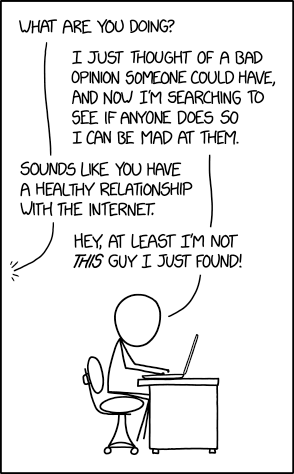Sunday, 25 November 2018 - 6:00pm
This week, I have been mostly reading:
- Bad Opinions — xkcd:

- What a widely attacked experiment got right on the harmful effects of prisons — a frustratingly short read by Ashley Rubin in the Conversation:
In news articles, the Stanford experiment has been “debunked” and “exposed as a fraud.” Its findings have been declared “very wrong” and “fake.” It has been further criticized for experimenter interference, faked behaviour from participants and for research design problems, among other things. These serious critiques have generated much discussion in academic circles and in news articles about what, if anything, we can learn from the experiment. And yet, as someone who studies prisons, I’m struck by how much the Stanford Prison Experiment got right. A wealth of other research suggests prisons have serious detrimental effects on prisoners and prison workers alike.
- Calculating art — an excerpt from the latest book by Hannah Fry of the splendidly light and fluffy podcast the Curious Cases of Rutherford and Fry:
In October 1997, an audience arrived at the University of Oregon to hear the pianist Winifred Kerner play three short pieces. One was a lesser-known keyboard composition by the master of the Baroque, Johann Sebastian Bach. A second was composed in the style of Bach by Steve Larson, a professor of music at the university. And a third was composed by an algorithm, deliberately designed to imitate the style of Bach. After hearing the three performances, the audience was asked to guess which was which. To Larson’s dismay, the majority voted that his was the piece that had been composed by the computer. And to collective gasps of delighted horror, the audience learned that the music they’d voted as genuine Bach was nothing more than the work of a machine.
- Water-Ski Signals — Phil Are Go!:

- Stop telling people who need social care they aren’t eligible – be honest, there isn’t enough money — Peter Beresford in the Conversation:
When giving evidence to the Public Accounts Committee about [social care funding] earlier in the year, the permanent secretary at the Department of Health and Social Care, Chris Wormald, told MPs that there was enough money in the social care system to meet all of its statutory obligations. Many of the MPs struggled to reconcile this with the savagery of the cuts since 2010 and the realities facing a service said by its leaders to be in crisis and at a “tipping point”. The truth is that Wormald probably didn’t have the first idea how much resource the service requires. That is because the system operates as a perfect circle – a need is only a need if there is resource to meet it. In this way, there can never be unmet need and “statutory obligations” are always met. It makes no difference how large or small the budget or how much it contracts. It’s a very convenient device for political leaders confronted by a service with high fiscal risk but low public value.
[Misleading headline. For a currency-issuing government there is always enough money, but the core argument — that the definition of need for services varies according to the willingness of the government to spend on these services, and that this is duplicitous and inhumane — is entirely sound.] - Off the Mark — by Mark Parisi:
- Death of American on remote Indian island is an indictment of fundie "bubble boy" mentality — Darrell Lucus at Daily Kos:
Never mind that the Sentinelese have made it clear on several previous occasions that they want to be left alone. According to Survival International, a human rights organization that advocates for indigenous people, this is largely because of a harrowing incident that happened during the British colonial era. A colonial administrator took some Sentinelese adults and children to Port Blair, the largest settlement in the Andaman Islands, for reasons of “science.” However, the adults quickly died; then as now, their isolation made them vulnerable to illnesses to which they had no immunity. The children were brought back with gifts, though Survival International has good reason to believe they also passed on diseases they picked up on Port Blair. […] Is it possible that Chau didn't know to find out why the Sentinelese didn't want to be contacted by anyone, let alone Christian missionaries? His diaries, provided by his family to The Washington Post, certainly suggest this. In one entry, he wondered, “Lord, is this island Satan’s last stronghold where none have heard or even had the chance to hear your name?”
- Toward Community-Oriented, Public & Transparent Copyleft Policy Planning — by Bradley M. Kuhn:
Sadly, the age of license proliferation has returned. It's harder to stop this time, because this isn't merely about corporate vanity licenses. Companies now have complex FLOSS policy agendas, and those agendas are not to guarantee software freedom for all. While it is annoying that our community must again confront an old threat, we are fortunate the problem is not hidden: companies proposing their own licenses are now straightforward about their new FLOSS licenses' purposes: to maximize profits. Open-in-name-only licenses are now common, but seem like FLOSS licenses only to the most casual of readers. We've succeeded in convincing everyone to “check the OSI license list before you buy”. We can therefore easily dismiss licenses like Common Clause merely by stating they are non-free/non-open-source and urging the community to avoid them. But, the next stage of tactics have begun, and they are harder to combat. What happens when for-profit companies promulgate their own hyper-aggressive (quasi-)copyleft licenses that seek to pursue the key policy goal of “selling proprietary licenses” over “defending software freedom”?
- Hidden Treasures — Bizarro by Dan Pirarro:

